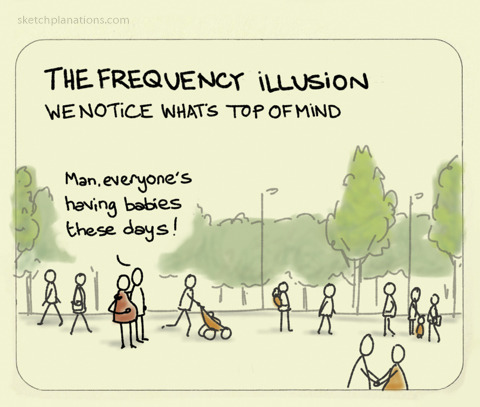
Years ago I was in the market to buy a new car. After researching different makes and models I narrowed my choice to a Subaru, a car I had previously never considered. Suddenly, I noticed Subarus everywhere.
For the first 69 years of my life, I never ate at Whataburger. But one day I overheard someone say that it was their favorite hamburger so I tried it out. It is a great meal. I’m sold. Suddenly, I saw Whataburger restaurants everywhere. I’ve been driving down to the family Lakehouse for the last five years and never noticed that there are four Whataburgers along the way. Of course, they were there all along; I’m just now seeing them.
There are several terms that describe this phenomenon; one is colloquial, coined by a journalist, and the other is a more academic phrase coined by a psychology professor.
The term Baader-Meinhof phenomenon was first used in 1994 by a commenter on the St. Paul Pioneer Press’ online discussion board, who came up with it after hearing, for the first time, the name of the ultra-left-wing German terrorist group twice in 24 hours. Once he was exposed to the name, he saw it often in various venues.
In 2006 Stanford professor Arnold Zwicky coined the phrase “frequency illusion” to describe this phenomenon. It’s caused, he wrote, by two psychological processes. The first, selective attention, kicks in when you’re struck by a new word, thing, or idea; after that, you subconsciously keep an eye out for it, and as a result find it surprisingly often. The second process, confirmation bias, reassures you that each sighting is further proof of your impression that the thing has gained sudden omnipresence.
We can use this phenomenon to our advantage. Since we tend to notice those things that are “top of mind” and overlook those that are not, let’s choose what we want to notice and pay attention to. For instance:
-
-
- We are surrounded by innumerable reasons to be grateful—life, freedom, friends—but we’ll remain unaware, and perhaps ungrateful, unless we look for them.
- We are encompassed by beauty—nature, children, music, books—but often don’t recognize it.
- God is at work in our lives but we may not recognize His activity because we’re looking elsewhere.
-
This concept has huge implications for goal setting. I’ve often wondered why, when we set a goal and go public with it, our chances of accomplishing the goal dramatically increase. The Baader-Meinhof phenomenon would suggest that once goals are placed in the forefront of our minds we’re more aware of them and we’ll devote more time and effort to achieving them.
For instance, several years ago I set a goal of making 50 new friends in a year. Having set and announced the goal, making friends become an important part of my conscious thinking. I constantly looked for potential friends and found them everywhere.
We can train our minds using this principle and prosper from it.
Plus – an article worth reading
If you have children or grandchildren, you need to read this article titled The No. 1 soft skill that predicts kids’ success more than IQ—and how to teach it .

Great piece, Don. Years ago I had a therapy client whose husband left her for a lover who happened to drive a green car. As she began counseling, she was seeing green cars everywhere despite the fact that intellectually, she knew they were not very many green cars. Interesting.
John, thanks for the example. Once we understand the concept, we see it everywhere.
Don- Happy Birthday!!!! I know that next year is our 25th anniversary. BUT, why do we not say our commitment as a church each year which we used to do?
Thanks, Clyde, for the birthday greeting. We thought that reciting the church creed had become a bit predictable and was losing it’s impact. We may bring it back for our 25th. Thanks for our friendship; it’s always good to see you in church.
Don, you might also want to look at the Reticular Activating System. It can have much to do with our ability to focus and influences what grabs our attention. For example: “The study found that both parents would sleep right through a plane taking off nearby (extremely loud). Yet the mother would wake up if the baby stirred in the next room (comparatively, a much lower sound level). And that’s the Reticular Activating System at work.” Advertisers have found humor activates the RAS and helps lock-in our attention on their products.
Rick, thanks for introducing me to a new term/concept. I’ll check into that. Thanks for reading my posts and responding.
I’ve always heard this referred to as the brain’s Reticular Activation System, which psychologists say can be trained. There is some fascinating reading out there on the topic. (Perhaps we will now start seeing more on this subject. – haha!)
Joey, thanks for the information; I have not heard of the RAS; I’ll check into it. Thanks for reading my posts and responding. Don
Don, all your “reflections” are great and very thoughtful and appreciated! This RAS is especially interesting to me. I now have a name for what has amazed me for years. My example is like Rick’s. I have always wondered how my wife would wake up to the slightest noise from one of the kids, as she told me the next morning. But, I would wake up to the not so loud noises that the house would make, or one of the pets’, but the rest of the household heard nothing!
Thanks, Bob, for responding. You’re right, we all have those things we’re sensitive to hear and see. We normally can hear the sound of our name even though when a crowded and noisy environment. Enjoy the holidays.